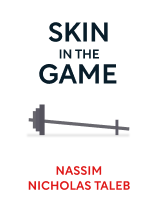

This article is an excerpt from the Shortform book guide to "Skin in the Game" by Nassim Nicholas Taleb. Shortform has the world's best summaries and analyses of books you should be reading.
Like this article? Sign up for a free trial here .
What is the Lindy effect? Why does the longer something has been around, the longer it will likely be around in the future?
Named after a deli in which actors are said to have casually invented the idea, the Lindy effect states that a nonperishable thing’s longevity is roughly equal to its current age. In other words, truly effective ideas, inventions, and institutions become less likely to die as time goes on. As Nicholas Taleb puts it, if something is “Lindy,” it “ages in reverse.”
In this article, we’ll explore the “Lindy effect” and show why, in the absence of the Lindy effect, false appearances slowly tear apart systems without skin in the game.
Skin in the Game and the Lindy Effect
The Lindy Effect is a principle that explains how systems with skin in the game self-correct and improve as time goes on.
As conceptual, nonperishable things like stories, companies, and religions age, they fall into two categories: they either get weaker or stronger. If a concept is fundamentally flawed, as time passes it is more likely to fail. Think of all the movies that succeed with huge box office numbers at release, but as years pass, no one watches them anymore.
On the other hand, if a concept is useful and/or effective, as time passes, the less likely it is to fail. Think of old classic movies like The Wizard of Oz and It’s a Wonderful Life that are still regularly watched today. As time goes by, the fact that people still value these movies attests to their lasting quality. Their old age actually makes them more likely to survive for even longer. This is the Lindy effect.
| The Lindy Effect and Technology Taleb is generally skeptical about the impact future technology will have on the human race. He asserts that people who try to predict the future assume that much more is going to change than actually does, overestimating the impact of new technology. It’s counterintuitive, but according to the Lindy effect, the newer a technology is, the less likely it is to be truly impactful. Although many new technologies end up changing the world, we ignore the countless new technologies that failed and faded from the public consciousness—a manifestation of the survivorship bias. People often argue that if you value old ideas, you’re adopting an old or outdated mindset. People who hang on to traditional ideas are sometimes said to be “stuck in the past.” Taleb claims that this is an unfounded criticism. The Lindy effect shows that ideas age in reverse—they get stronger over time. |
The Lindy effect functions through skin in the game. When people with skin in the game make efforts to minimize risk and loss, they eliminate whatever is ineffective. But if people are shielded from the consequences of their actions, ineffective or harmful ideas are indistinguishable from beneficial ideas.
Taleb states that the test of time in conjunction with skin in the game is the only inerrant judge of quality. Given enough time and skin in the game, everything effective will survive and everything ineffective will die out. This is the mechanism behind humanity’s advancement.
Intellectualism Opposes Skin in the Game
It takes a long time for the Lindy effect to make things better, and it’s difficult to observe in action. On the other hand, it’s easy to see successful people working to make things better—leaders, entrepreneurs, inventors. Consequently, many people over-attribute human progress to skilled, gifted individuals instead of the systems that filter out failure and reward success. This is the foundation of the philosophy of Intellectualism.
“Intellectualism,” in the sense Taleb uses here, is the school of thought stating that rational humans have the capacity to replace skin in the game as judges and reliably distinguish good from bad. Consequently, intellectualists believe that systems should be designed by a select few instead of being allowed to evolve over time. Intellectualism overestimates the reliability of human intellect and underestimates the world’s complexity and unpredictability.
Intellectualists fail to see the Lindy effect at work and rarely acknowledge its existence. As a result, Taleb insists that institutions based on the Intellectualist ideology are destined to fail.
| Intellectualism is associated with top-down decision-making—for example, centralized urban planning. As outlined in Antifragile, Taleb vastly prefers bottom-up decision-making—individuals deciding where and why to construct their own buildings.Bottom-up decision making works because it involves skin in the game. If the people don’t like something—for example, the layout of an apartment building—it’s reflected in the supply and demand, and the design disappears. As a result, bottom-up planning involves the constant micro-destruction necessary for the Lindy effect to operate.Top-down decision-making, on the other hand, is protected from destruction. Taleb claims that the 2005 French riots were caused in part by the unnatural, alienating design of the housing projects designated for those in poverty. Top-down decisions are not easily revoked, resulting in mass permanent dissatisfaction. |

———End of Preview———
Like what you just read? Read the rest of the world's best book summary and analysis of Nassim Nicholas Taleb's "Skin in the Game" at Shortform .
Here's what you'll find in our full Skin in the Game summary :
- Why having a vested interest is the single most important contributor to human progress
- How some institutions and industries were completely ruined by not being invested
- Why it's unethical for you to not have skin in the game






